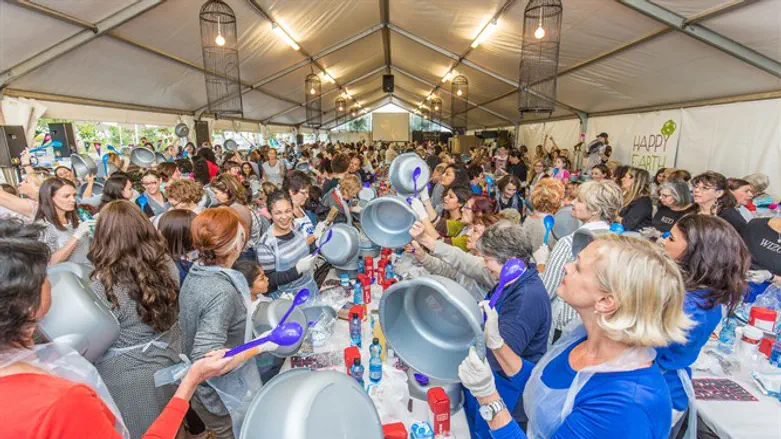
This year, the global Shabbat Project reached amazing proportions, with over 1 million Jews in 1160 cities spread over 94 countries joined in. In Israel alone, 163 cities and towns took part in the "global Shabbat" that was held on November 11-12.
The Shabbat project isn't just about Shabbat itself - it also includes pre-Shabbat challa baking activities, as well as post-Shabbat havdalah and musical ceremonies.
This year's goal was 1 million people and 1000 cities, after last year's event gathered participants located in 919 cities in 84 countries around the world.
"Participation in the Shabbat Project was greater than ever," said founder Rabbi Warren Goldstein. "It's incredibly fulfilling and inspiring to see how the 'global Shabbat' has connected a million Jews. To see how Jews from all over the world, from different backgrounds, worked together to turn this uplifting moment into a special moment of Jewish unity. An enormous number of Jews kept Shabbat for the first time in their lives, and more importantly, they connected with people who are different from them, who they don't see every day.
"We're witness to an amazing wave of unity that is sweeping the Jewish world. Jews from all backgrounds have adopted the 'global Shabbat' and put aside their arguments and differences, gathering together out of love and unity. It seems that more and more people are connecting to the ideas that form the foundation of the 'global Shabbat' - and that's the greatest gift that Shabbat gives the modern world and global Judaism," Goldstein concluded.
Big stories and small are starting to pour in from around the world, about how 8000 women participated in a challah baking event in Buenos Aires; how 15 families from Cancun's small Jewish community made a communal Shabbat; how, in Mexico, Jews kept Shabbat for the first time; how 850 Jews in Sydney participated in a musical kabbalat Shabbat on Bondi Beach.
There were stories about the kabbalat Shabbat on a cruise ship in the Atlantic Ocean, and how a lone Jew in Karachi, Pakistan decided he would keep Shabbat together with the rest of the Jewish world. And while more than 1000 Israelis from all different backgrounds ate a Shabbat meal together at the Hangar in Tel Aviv, there were another 29 Shabbat Project locations throughout the city.
Tel Aviv was one of 163 cities and towns in Israel to take part in the "global Shabbat." In many places, you could see neighbors in an apartment building doing a "building-wide" kiddush, and entire streets got together to do a shared Shabbat meal.
The idea for that was actually born last year in Ra'anana, a city which is now at the forefront of the Shabbat Project efforts, holding challah baking events for new immigrants (olim) in several different languages, as well as a musical kabbalat Shabbat and havdalah, with 2000 participants.
France was also a Shabbat Project leader this year, with 19 cities participating, including Paris, Nice, Strasbourg and Grenoble. In Paris, there was a musical havdala attended by 3,000 people and featuring Shlomi Shabat and Yishai Lapidot.
In order to plan such a global project, 6,000 partners speaking 8 languages flocked to the office of Rabbi Goldstein, who is also Chief Rabbi of Johannesburg. The initiative was started as a popular movement, and that's the secret of its success.
"That's why we can say that more than anything else, the Shabbat Project is a people's movement, which happened because of people and for people," Rabbi Goldstein noted.
"In 2014 and 2015, we saw what the power of Shabbat influenced private people and communities, and we saw we could do things that had previously seemed impossible. We saw how barriers came down, how families connect and deeper feelings are awakened. It's all in the merit of Shabbat. Big ideas can change the world, and the Jewish world needs them now more than ever. The Shabbat Project is a story of return to our Jewish roots, and reconnecting to our heritage, coming back to our natural connections and the natural connection - it all happens because of Shabbat," Rabbi Goldstein concluded.